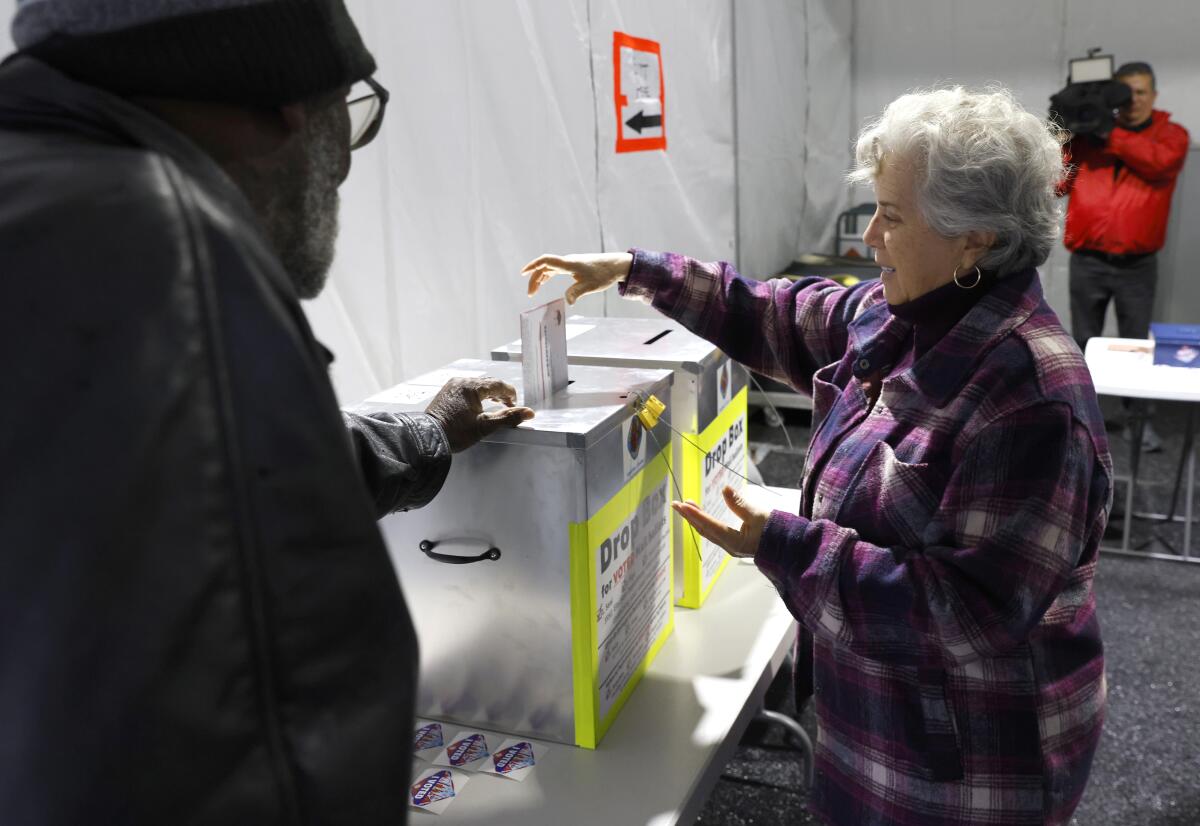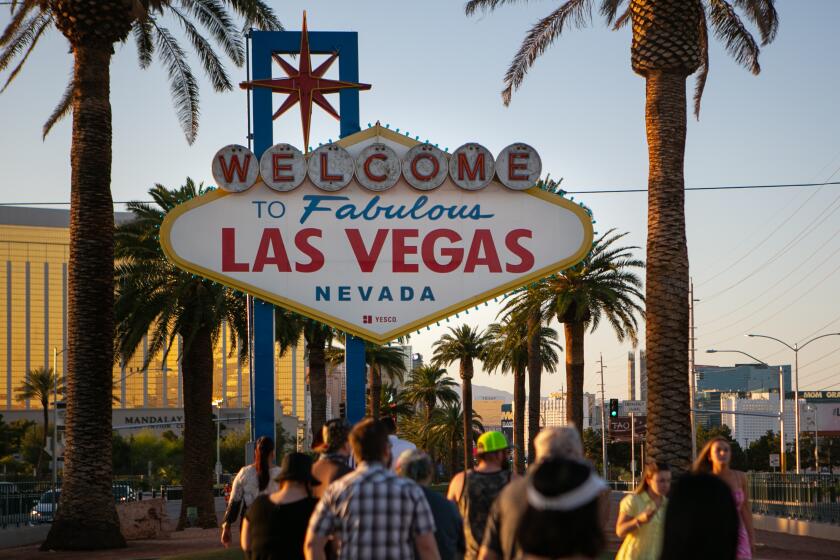‘None of these candidates’ wins most votes in Nevada GOP primary, more than Nikki Haley

- Share via
LAS VEGAS — The “none of these candidates” option has won in Nevada’s symbolic Republican presidential primary contest, an embarrassing result for Nikki Haley, who was the only major candidate on the ballot.
The former U.N. ambassador opted to compete in the state-run primary election Tuesday instead of the party’s presidential caucuses, the only contest in the state that awards delegates toward the nomination. Former President Trump is the only major candidate competing in the caucuses on Thursday night and is expected to sweep all of Nevada’s delegates as result.
Utilizing a quirk of Nevada election law, more voters on Tuesday marked their primary ballots for “none of these candidates” than cast their votes for Haley.
Haley had said beforehand she was going to “focus on the states that are fair” and did not campaign in Nevada. Her campaign wrote off the primary results with a reference to the state’s casino industry.
Nevada Republicans can vote two times in the GOP presidential nominating process. Nikki Haley will likely get the headlines while Donald Trump wins the state’s delegates.
“Even Donald Trump knows that when you play penny slots the house wins,” spokeswoman Olivia Perez-Cubas said. “We didn’t bother to play a game rigged for Trump. We’re full steam ahead in South Carolina and beyond.”
“They basically told us they don’t care about us,” Washoe County Republican Party Chair Bruce Parks, who pushed for the GOP to hold caucuses, said after the race was called. “By marking ‘none of these candidates,’ we respond in kind — we don’t care about you either.”
There was also a Democratic primary on Tuesday, which President Biden easily won against author Marianne Williamson and a few less-known challengers. Rep. Dean Phillips of Minnesota was not on the ballot.
Haley’s campaign balked at the $55,000 fee the Nevada GOP was charging candidates to participate in the caucuses.
“We have not spent a dime nor an ounce of energy on Nevada. We made the decision early on that we were not going to pay $55,000 to a Trump entity to participate in a process that is rigged for Trump,” Haley campaign manager Betsy Ankney told reporters Monday. “Nevada is not and has not been our focus.”
Nevada lawmakers added “none of these candidates” as an option in all statewide races post-Watergate as a way for voters to participate but express dissatisfaction with their choices. “None” can’t win an elected office, but it drew the most votes in primary congressional contests in 1976 and 1978. It also got more votes than Republican George H.W. Bush and Democrat Edward M. Kennedy in Nevada’s 1980 presidential primaries.
A federal appeals court has rejected Donald Trump’s claim that former presidents should be shielded from prosecution on criminal charges.
The caucuses on Thursday are the only Nevada contest that count toward the GOP’s presidential nomination. But they were seen as especially skewed in favor of Trump because of the intense grassroots support they require from candidates and new state party rules that benefited him.
Trump is expected to handily win the caucuses, which should deliver him all 26 of the state’s delegates. Delegates are party members, activists and elected officials who vote at the national party conventions to formally select the party’s nominee.
“If your goal is to win the Republican nomination for president, you go where the delegates are. And it baffles me that Nikki Haley chose not to participate,” Trump senior campaign advisor Chris LaCivita said in an interview before the primary.
Nevada, the third state in the Republican field after Iowa and New Hampshire, was set to hold a state-run primary election instead of party-run caucuses after the Legislature changed the law to try to boost participation.
Caucuses typically require voters to show up for an in-person meeting at a certain date and time, while elections can offer more flexibility to participate, with polls open for most of the day on election day, along with mail, absentee or early voting.
But Nevada Republicans chose to hold party-run caucuses instead, saying they wanted certain rules in place, such as a requirement that participants show a government-issued ID.
The caucuses require a candidate to intensely organize supporters around the state in order to be competitive, a feat that Trump, as a former president and the Republican front-runner, was easily positioned to do.
The Nevada GOP also restricted the involvement of super PACs like the one Florida Gov. Ron DeSantis was relying on to boost his campaign before he dropped out. And the party barred candidates from appearing both on the primary ballot and in the caucuses.
Former Vice President Mike Pence and Sen. Tim Scott of South Carolina also signed up to compete in Nevada’s primary instead of the caucuses before ending their presidential campaigns.
More to Read
Get the L.A. Times Politics newsletter
Deeply reported insights into legislation, politics and policy from Sacramento, Washington and beyond. In your inbox three times per week.
You may occasionally receive promotional content from the Los Angeles Times.












